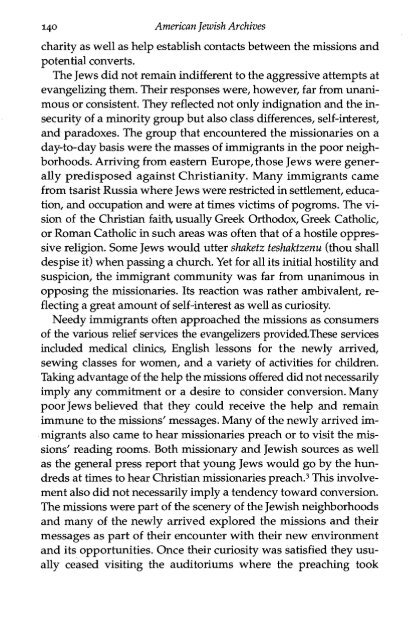You also want an ePaper? Increase the reach of your titles
YUMPU automatically turns print PDFs into web optimized ePapers that Google loves.
140 <strong>American</strong> <strong>Jewish</strong> <strong>Archives</strong><br />
charity as well as help establish contacts between the missions and<br />
potential converts.<br />
The Jews did not remain indifferent to the aggressive attempts at<br />
evangelizing them. Their responses were, however, far from unanimous<br />
or consistent. They reflected not only indignation and the insecurity<br />
of a minority group but also class difference~, self-interest,<br />
and paradoxes. The group that encountered the missionaries on a<br />
day-to-day basis were the masses of immigrants in the poor neighborhoods.<br />
Arriving from eastern Europe, those Jews were generally<br />
predisposed against Christianity. Many immigrants came<br />
from tsarist Russia where Jews were restricted in settlement, education,<br />
and occupation and were at times victims of pogroms. The vision<br />
of the Christian faith, usually Greek Orthodox, Greek Catholic,<br />
or Roman Catholic in such areas was often that of a hostile oppressive<br />
religion. Some Jews would utter shaketz teshaktzenu (thou shall<br />
despise it) when passing a church. Yet for all its initial hostility and<br />
suspicion, the immigrant community was far from unanimous in<br />
opposing the missionaries. Its reaction was rather ambivalent, reflecting<br />
a great amount of self-interest as well as curiosity.<br />
Needy immigrants often approached the missions as consumers<br />
of the various relief services the evangelizers provided.These services<br />
included medical clinics, English lessons for the newly arrived,<br />
sewing classes for women, and a variety of activities for children.<br />
Taking advantage of the help the missions offered did not necessarily<br />
imply any commitment or a desire to consider conversion. Many<br />
poor Jews believed that they could receive the help and remain<br />
immune to the missions' messages. Many of the newly arrived immigrants<br />
also came to hear missionaries preach or to visit the missions'<br />
reading rooms. Both missionary and <strong>Jewish</strong> sources as well<br />
as the general press report that young Jews would go by the hundreds<br />
at times to hear Christian missionaries preach.3 This involvement<br />
also did not necessarily imply a tendency toward conversion.<br />
The missions were part of the scenery of the <strong>Jewish</strong> neighborhoods<br />
and many of the newly arrived explored the missions and their<br />
messages as part of their encounter with their new environment<br />
and its opportunities. Once their curiosity was satisfied they usually<br />
ceased visiting the auditoriums where the preaching took

















